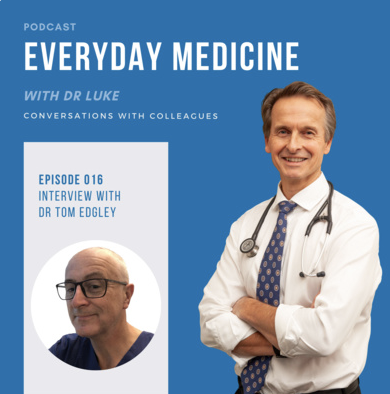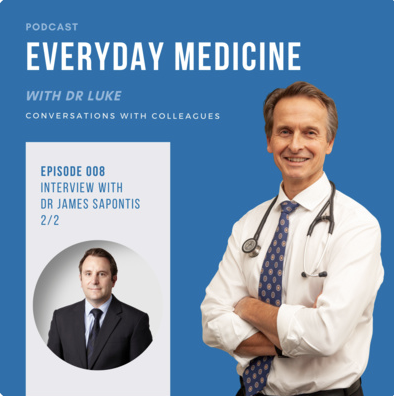Everyday Medicine by Dr Luke Crantock
Conversations with colleagues providing helpful ideas and advice in healthcare
Episode 20. Endoanal ultrasound and anorectal physiology with Dr TC Nguyen
Endorectal ultrasonography combined with anorectal physiology allows the evaluation of the constituents of the wall of the anal canal and the scientific understanding of anorectal pathophysiology. It is very important to appreciate a patient's anorectal dynamics before initiating an effective management strategy for what may be a wide variety of pelvic-anorectal disorders.
Episode 19. Robotic Surgery with Dr TC Nguyen
Robotic assisted surgery allows doctors to perform complex procedures with more precision, flexibility and control than is possible with conventional techniques. Now used in many forms of surgery including cardiac, prostatic and orthopaedic, in this episode we are joined by the dynamic and highly skilled Mr T C Nguyen who discusses
Episode 17. CBD with Dr Sud Agarwal
Medical cannabinoids are derived from the cannabis sativa plant. There are 144 known cannabinoids, THC is perhaps the best known for its psycho-active effects, however cannabidiol (CBD) is now being recognised for its many medical applications.
Episode 16. Trauma Courses with Dr Tom Edgley
In 2019 experienced anaesthetist Dr Tom Edgley was left to defend his two properties in the rural and bushy enclave of Tonimbuk from the disastrous fires claiming over 26 properties in the region. Not only did Tom survive protecting his properties from the fire, but he also lent a major hand to his neighbours and was involved in the emotional rehabilitation of his community.
Episode 15. Type 2 Diabetes with Dr Chin Tan
In this episode we have a conversation about Type 2 diabetes, a condition that affects at least 1.2 million Australians (5% of Australians) and for which there are a complex number of pharmacologic treatment strategies available.
Episode 14. Faecal Microbiota Transplant with Dr Darcy Holt
The transfer of stool from a healthy donor into the gastrointestinal tract of a recipient (FMT) at first consideration does not seem like a reasonable or scientific approach to the treatment of gastrointestinal diseases. Historically however, it has been used by communities for over 3,000 years, gaining credibility in 1958 after a paper by Eisemen in Denver who described treating pseudomembranous colitis this way.
Episode 13. Biologics and Small Molecules in IBD with Dr Darcy Holt
DARCY HOLT - BIOLOGICS AND SMALL MOLECULES FOR INFLAMMATORY BOWEL DISEASE Biologic agents (produced in living organisms or containing components of living organisms) coupled with a variety of new small molecules (acting in novel ways to influence the human immune system) have dramatically improved medical management of inflammatory bowel disease.
Episode 12. IBD with Dr Catherine Sorrell
Inflammatory Bowel Disease (IBD) affects approximately 85,000 Australians and 5 million people worldwide and includes Crohn's disease and ulcerative colitis. These conditions may have a major impact on patient's quality of life.
Episode 11. Spinal Cord Stimulation with Dr Paul Verrils
Australia has led the world in pain management, interventional techniques and pain research including in the management of severe and debilitating axial and musculoskeletal pain via spinal cord and DRG stimulation as well as in several evolving techniques for the management of visceral pain.
Episode 10. Barrett's Oesophagus with Dr Puneet Mahindra
In this episode I have a conversation with Dr Puneet Mahindra on the subject of Barrett's oesophagus. Puneet not only discusses the origins of this condition, named after Australian born thoracic surgeon Mr Norman Barrett, but also discusses - · Its relationship to chronic reflux disease · Adenocarcinoma risk · Surveillance guidelines · Appropriate medical management Puneet makes the point that Barrett's oesophagus is an important reason why we should all take gastro-oesophageal reflux disease seriously.
Episode 9. Gastro-Oesophageal Reflux Disease with Dr Puneet Mahindra
In this episode I interview experienced gastroenterologist Dr Puneet Mahindra on the common clinical problem of gastro-oesophageal reflux disease. Puneet details - · Risk factors · Complications · Approaches to management He provides personal tips drawn from experience and the literature outlining an approach that should be helpful to everyone practicing clinical medicine.
Episode 8. Heart Failure with Dr James Sapontis
It is estimated that at least 300,000 Australians have chronic heart failure imposing a significant impact on the quality of life and mortality. In this podcast episode, we are joined by an experienced interventional cardiologist, Dr James Sapontis, as we explore heart failure with preserved ejection fraction (HFpEF) and heart failure with reduced ejection fraction (HFrEF).
Episode 7. Coronary CT Angiography (CCTA) with Dr James Sapontis
It is estimated that 1 in 4 Australian deaths relate to cardiovascular disease and that there are over 60,000 acute coronary events, including either angina or myocardial infarctions, recorded each year in Australia. In an attempt to reduce morbidity and mortality medical efforts have been directed to primary prevention and improving the selection of patients likely to require coronary intervention, such as cardiac stenting or revascularisation.
Episode 6. Bariatric Surgery with Mr Ray McHenry
In this episode we have a very interesting conversation with one of Australia's leading bariatric surgeons, Mr Raymond McHenry, on surgical approaches to weight loss, focussing particularly on the gastric sleeve and roux-en-y gastric bypass operations.
Episode 5. COVID-19 with Dr Babak Rad
Covid 19 has brought forth upon the world a pandemic unrivalled since the Spanish flu (1918 - 1920) caused by H1N1 influenza A. Described by Australian Treasurer Josh Frydenberg as the "new and invisible enemy", every doctor has had to avail themselves of knowledge regarding this highly contagious virus.
Episode 4. Hepatitis C with Dr Ferry Rusli
In this episode I have a conversation with hepatologist and gastroenterologist Dr Ferry Rusli in a four-part series on liver disease where we explore chronic hepatitis C, its population reservoirs in Australia and approaches to treatment. In particular, Ferry points out - · The need to increase our effectiveness at treating hepatitis C in at risk populations.
Episode 3. Hepatitis B with Dr Ferry Rusli
In this episode I talk with experienced gastroenterologist and hepatologist Dr Ferry Rusli on the subject of hepatitis B in a four-part series on liver disease. Ferry discusses - · the prevalence of hepatitis B in the Asia Pacific region · the long-term complications and consequences of hepatitis B · treatment options including pharmacological therapies which are currently falling short of the national target for patients receiving treatment.
Episode 2. Non-Alcoholic Fatty Liver Disease with Dr Ferry Rusli
In this episode I am joined by Dr Ferry Rusli, an experienced gastroenterologist and hepatologist to discuss non-alcoholic fatty liver disease in a four-part series on hepatology. Ferry discusses the relevance of non-alcoholic fatty liver disease to the metabolic syndrome and some key management points, in particular focussing on controlling body mass index. There is much to learn from this conversation with Ferry, I hope you enjoy the conversation.
Episode 1. Abnormal Liver functions with Dr Ferry Rusli
In this episode I interview gastroenterologist and hepatologist Dr Ferry Rusli in the first of a four-part series on liver disease. Ferry discusses his approach to a patient presenting with abnormal liver function tests and navigates us through - · Obstructive liver patterns · Hepatitic patterns Ferry will address in broad terms common aetiologies such as non-alcoholic fatty liver disease, chronic hepatitides, acute viral infections, biliary obstruction, malignancy and the possibility of drug side-effects.




















